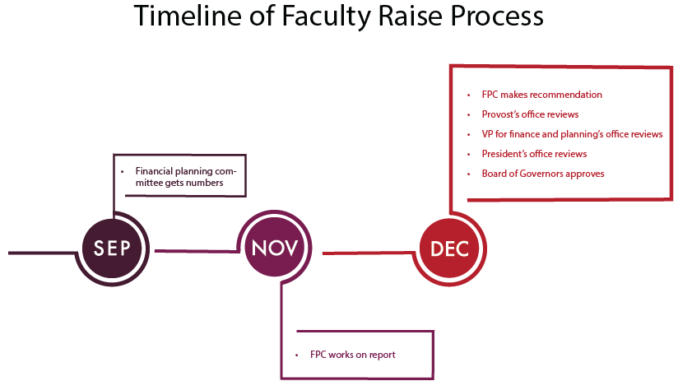
Truman State University’s salary raises were minimal for years because of the way hiring was conducted dating back to the late 90s, said Kathryn Brammall, president of Faculty Senate and history department chair.
Salary raises have become more of a priority and are determined by the Faculty Senate’s philosophy about salary priorities and the financial planning committee’s recommendations, Brammall said.
Brammall said the salaries have continued to fall further behind other universities for several years.
“For many of my 25 years, there were no salary increases, or there were nominal dollar amounts, so, you know, a $500 raise or maybe a $1500 raise, which would again help … because everybody gets the same amount, but the cumulative effect was that Truman was falling further and further and further behind our competition if you think about it in terms of who can hire the best faculty,” Brammall said.
Around 1994, about 40 faculty — mostly full professors — were hired at the same time and paid using performance-funding money from the state which was added on top of Truman’s core budget. When this money ran out, however, there were no raises for many years because too many faculty had not been factored into the core budget, Brammall said.
“We hired a lot of people in kind of a bubble there,” Dave Rector, vice president of administration, finance and planning, said. “It’s almost like if you ever heard about the baby boom with demographics, we had our own little faculty boom there.”
Many positions were added and those professors worked their way up to the full professor rank, staying for many years. Rector said now that group is starting to retire. The assistant professor number, a lower rank, is bigger than the associate professor number because of the retirements.
This “bubble” of full professors had to be worked through, Rector said. Full professors felt like they were getting behind other ranks at Truman because everyone’s salaries were going up the same amount. It became more difficult to give raises to an already relatively-high salary of full professors who had been working at Truman a long time.
As professors retire, new professors are being hired, but not on the same scale as the late 90s. Many of the retirees’ positions will not be replaced. There will also be a larger number of non-tenure track hires, Brammall said. The University is hiring fewer professors, but their starting salaries are more, and current faculty’s salaries are being increased as well.
Truman salaries have contributed to making hiring difficult the past few years, Brammall said. There would be candidates who would get through the interview stage and have an offer only to then decline when they saw the starting salary.
It also became difficult to retain faculty. The difficulty hiring and starting salaries being below the national median gained the attention of the administration, who then made faculty salaries a priority, Brammall said.
“I don’t think it means that lesser quality faculty came,” Brammall said. “I think it means we had lines unfilled.”
Relatively few qualified candidates apply for positions at Truman, and those that do apply have many other, potentially better options available to them, said Alan Garvey, computer science department chair.
“I mean, we have definitely had candidates who have told us that they’re not taking the job because the salary is too low,” Garvey said. “ That’s true across a lot of disciplines that … Truman salaries are just kind of inherently a little bit lower than some other places.”
Brammall said the administration has been empathetic to hiring issues for a long time. Lower faculty numbers have meant existing faculty have to figure out different ways to offer curriculum, Brammall said.
Faculty have tried to adjust by creating new and interesting programs that won’t require many new hires, Brammall said. Departments have had to offer fewer sections for classes and fewer electives. Several majors, such as Russian, athletic training and interdisciplinary systems have been cut when they could no longer be supported.
“We’re a liberal arts place, and the faculty and the administrators’ problem-solving is one of our things. So the solutions are not always perfect, and we have to be nimble, and we have to change,” Brammall said. “But the people here are committed to making the Truman experience an excellent experience for students. It is unfortunate that as more and more cuts happen, students are impacted. We would prefer that not be the case, but the reality is that our students have to understand that too.”
